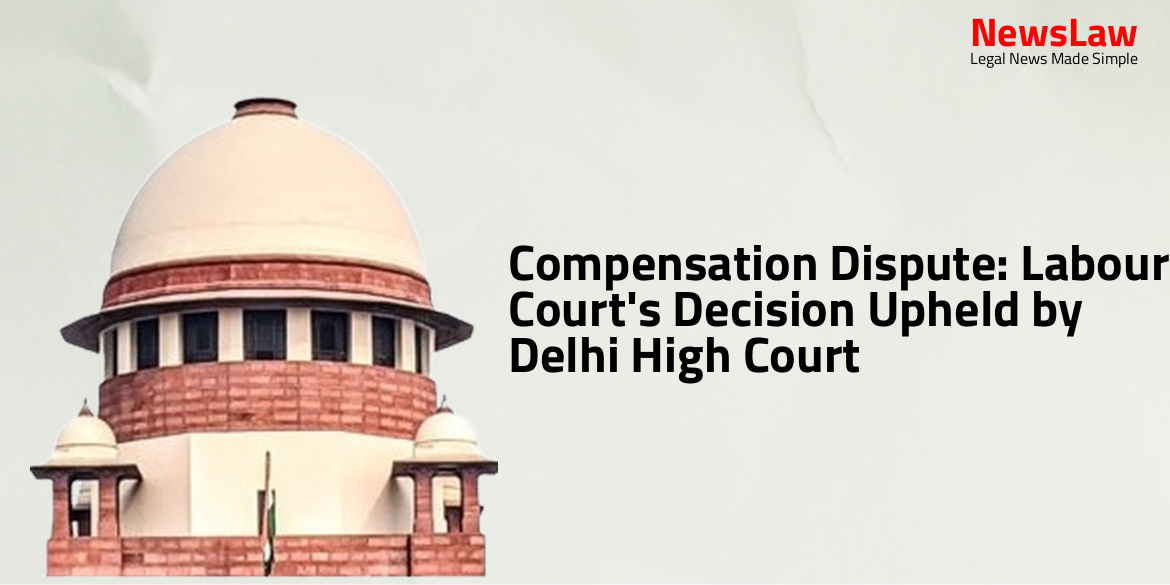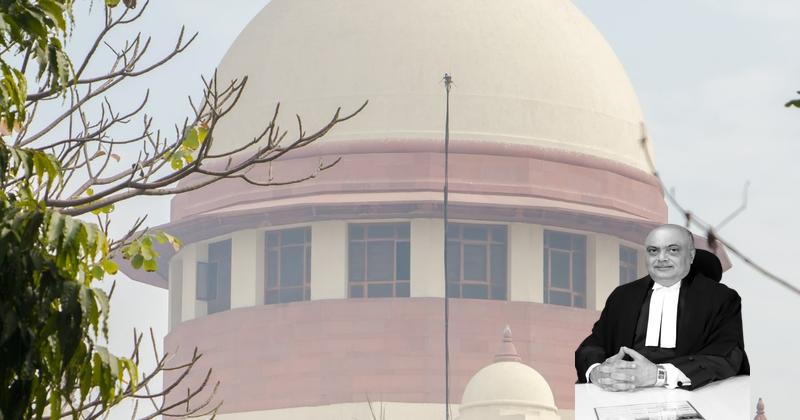In a recent legal ruling, the Delhi High Court has affirmed the decision of the Labour Court in a compensation dispute case. The Court has directed the management to pay Rs. 2,00,000 to the workman within one month, with applicable interest if delayed. This judgment comes after a series of petitions challenging the award were dismissed by the Court. Stay informed on the latest developments in this case!
Facts
- The Labour Court failed to acknowledge that the workman received a salary consistent with an unskilled designation and never contested it during employment.
- The Industrial Tribunal’s judgment did not designate the workman as skilled according to the scheduled employment rates provided for unskilled workers.
- The workman, without objection, accepted the salary prescribed for unskilled work throughout their tenure.
- The Labour Court erroneously referenced unrelated judgments of the Supreme Court and High Court to support its decision.
- The Union did not pursue implementation of the impugned Award, indicating lack of urgency in seeking a stay despite a pending application.
- The stay was improperly connected to judgments not applicable to the present case.
- The management settled with two workers in the transfer case by paying them Rs. 5,000 each.
- The Labour Court failed to consider the lack of urgency on the part of both parties in the Writ Petition, indicating a stay was unnecessary.
- Twenty workers did not work from the date of transfer until rejoining the management.
- The learned Labour Court decided in favor of the respondent workman and against the petitioner entity.
- The respondent workman was awarded a lump-sum compensation of Rs. 200,000 to be paid by the management within one month of the publication of the award.
- If the payment is delayed, the management would be liable to pay interest at 9% per annum.
- Reinstatement was not considered due to the imminent closure of the management.
- The workman is entitled to wages of the skilled/semi-skilled category which were not previously paid by the management.
- The retrenchment compensation was deemed inadequate and hence illegal as per the decision by the Hon’ble Delhi High Court.
- The designation case decided in favor of the workers granted them skilled and semi-skilled worker status, which should have been considered for calculating retrenchment compensation.
Issue
- Issue No. 2 in the case pertains to the reliance on a stayed award of the Industrial Tribunal by the Labour Court for determining entitlement to compensation.
- The Workman in question received unskilled labour salary from the date of appointment till the time of retrenchment.
- The key question for the Court to decide is whether the Labour Court’s decision based on the stayed Industrial Tribunal award is justifiable.
- The Court needs to ascertain whether intervention under Article 226 of the Constitution of India is warranted regarding the Labour Court’s award.
Arguments
- The petitioner argues that the impugned award was passed without considering all the facts and circumstances of the matter.
- Despite the Industrial Tribunal declaring transfer orders as illegal, the petitioner took the matter to court and reinstated the workman to avoid liability under section 17B of the Act.
- The workman is allegedly being punished by the petitioner for forming a union and seeking redressal of grievances before labor authorities.
- The petitioner contends that the retrenchment compensation issue is not clear-cut and does not indicate any malicious intent on their part.
- The petitioner asserts that it is not within the writ jurisdiction of the Court to reevaluate evidence and material present in the case, especially without showing any illegality or perversity.
- The petitioner insists that the Labour Court was justified in passing the impugned award.
- The argument includes a mention that if the award dated 29 September, 2009, in the designation matter is set aside, the current award would become nullified.
- The petitioner highlights that the workman had been categorized and paid as an unskilled laborer since 1994 without any objections during his service.
- There is a contention that the High Court itself clarified in Writ Petition No. 3014/2010 that the Industrial Tribunal’s conclusion without documents was not maintainable in law.
- Granting designation to the claimant has been stayed by the correct calculation of retrenchment compensation based on last drawn wages, not on the earlier award.
- The claimant had previously filed a case against his transfer, during which it was determined that he was engaged in unskilled work.
- The award from the transfer case was not challenged by the claimant before any forum, making it final and operating as res judicata.
Analysis
- The learned Labour Court correctly held that the management violated Section 25F of the Act by not compensating the workman appropriately upon retrenchment.
- The Industrial Tribunal’s designation award in 2009, which was still in effect during the retrenchment in 2010, should have been used to calculate compensation based on skilled/semi-skilled category.
- The management failed to adequately calculate notice pay and retrenchment compensation as per the 2009 award, resulting in a violation of Section 25-F of the Act.
- The workman did not provide evidence contradicting the seniority list prepared by the management, which was on record and sent to the Labor Commissioner.
- The learned Labour Court’s decision to award compensation based on the designated category in the earlier award was justified given the circumstances and evidence presented.
- The stay on the 2009 award came after the illegal retrenchment had already occurred, thereby justifying the compensation awarded by the Labour Court.
- The dispute regarding the workman’s designation and the earlier award did not impact the Labour Court’s decision regarding the compensation owed during the retrenchment.
- Section 144 CPC provides for varying, reversing, setting aside, or modifying a decree, including interim orders.
- Successful party at the final stage is entitled to demand compensation and restitution of benefits lost by the opposite party under interim orders.
- Cases like Nava Bharat Ferro Alloys Ltd. and State of Rajasthan v. J.K. Synthetics Limited highlight the principles of restitution when interim orders are reversed.
- The judgment in Shree Chamundi Mopeds Ltd. emphasizes restoring parties to the position they would have been without the interim orders.
- Judicial dicta in various cases support the need for restitution upon dismissal of writ petitions or interim orders.
- The distinction between repeal and suspension of laws is crucial, with repeal eliminating a law entirely and suspension temporarily halting its operation.
- Judgments like South Eastern Coalfields Ltd. v. State of M.P. and Rajasthan Housing Board v. Krishna Kumari provide clarity on liability for interest or surcharges when interim orders are lifted.
- The obligation to pay compensation to workmen upon closure of an undertaking due to genuine reasons is a well-established legal principle.
- Section 25-F of the Industrial Disputes Act lays down conditions for retrenchment of a workman.
- Employer must give one month’s notice or pay wages in lieu of notice.
- Employer must pay compensation equivalent to fifteen days average pay for every completed year of continuous service or any part thereof in excess of six months during retrenchment.
- Notice to the appropriate government is required to have a valid claim for compensation under Section 25-F.
- Workman must have been in continuous service for at least one year with the employer to claim compensation.
- The Court found no merit in the batch of petitions and upheld the findings of the Labour Court.
- The petitioner management failed to present any compelling arguments in their favor.
- The Labour Court consistently found that the retrenchment of workmen by the management was illegal as they were not compensated appropriately according to their designations.
Decision
- The issue before the Labour Court was the legality and justification of the workman’s retrenchment.
- The petitions challenging the award were dismissed by the Court.
- The management is directed to pay Rs.2,00,000/- to the workman within one month from the date of the award.
- Interest at 9% per annum will be applicable if payment is delayed.
- Each party is to bear their own costs.
- Copies of the award to be sent to the Govt. of NCT of Delhi for publication.
- The file is to be consigned to the record room.
- The management must pay the compensation awarded by the Labour Court to the respective workmen within three months.
- The judgment is to be uploaded on the website.
- The impugned award in each petition is upheld by the Court.
- Pending applications are dismissed.
- The judgment of No 185/10 from the Labour Court is upheld.
Case Title: SAWHNEY RUBBER INDUSTRIES Vs. SH. AVDESH SHAH (2024:DHC:4569)
Case Number: W.P.(C)-7985/2020



